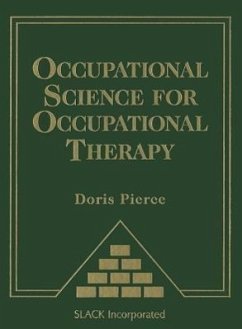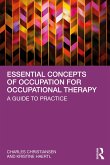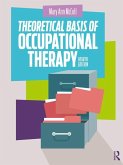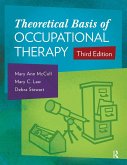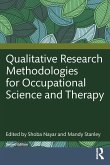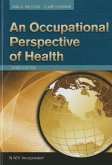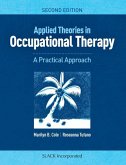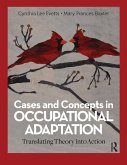Doris Pierce
Occupational Science for Occupational Therapy
Doris Pierce
Occupational Science for Occupational Therapy
- Gebundenes Buch
- Merkliste
- Auf die Merkliste
- Bewerten Bewerten
- Teilen
- Produkt teilen
- Produkterinnerung
- Produkterinnerung
Occupational Science for Occupational Therapyarticulates how occupational science research produces unique insights into occupation and increases the effectiveness of occupational therapy interventions.
Andere Kunden interessierten sich auch für
![Essential Concepts of Occupation for Occupational Therapy Essential Concepts of Occupation for Occupational Therapy]() Charles ChristiansenEssential Concepts of Occupation for Occupational Therapy34,99 €
Charles ChristiansenEssential Concepts of Occupation for Occupational Therapy34,99 €![Theoretical Basis of Occupational Therapy Theoretical Basis of Occupational Therapy]() Mary Ann McCollTheoretical Basis of Occupational Therapy84,99 €
Mary Ann McCollTheoretical Basis of Occupational Therapy84,99 €![Theoretical Basis of Occupational Therapy Theoretical Basis of Occupational Therapy]() Mary Ann McCollTheoretical Basis of Occupational Therapy104,99 €
Mary Ann McCollTheoretical Basis of Occupational Therapy104,99 €![Qualitative Research Methodologies for Occupational Science and Occupational Therapy Qualitative Research Methodologies for Occupational Science and Occupational Therapy]() Qualitative Research Methodologies for Occupational Science and Occupational Therapy37,99 €
Qualitative Research Methodologies for Occupational Science and Occupational Therapy37,99 €![An Occupational Perspective of Health An Occupational Perspective of Health]() Ann WilcockAn Occupational Perspective of Health140,99 €
Ann WilcockAn Occupational Perspective of Health140,99 €![Applied Theories in Occupational Therapy Applied Theories in Occupational Therapy]() Marilyn B. ColeApplied Theories in Occupational Therapy120,99 €
Marilyn B. ColeApplied Theories in Occupational Therapy120,99 €![Cases and Concepts in Occupational Adaptation Cases and Concepts in Occupational Adaptation]() Cynthia Lee EvettsCases and Concepts in Occupational Adaptation82,99 €
Cynthia Lee EvettsCases and Concepts in Occupational Adaptation82,99 €-
-
-
Occupational Science for Occupational Therapyarticulates how occupational science research produces unique insights into occupation and increases the effectiveness of occupational therapy interventions.
Hinweis: Dieser Artikel kann nur an eine deutsche Lieferadresse ausgeliefert werden.
Hinweis: Dieser Artikel kann nur an eine deutsche Lieferadresse ausgeliefert werden.
Produktdetails
- Produktdetails
- Verlag: Taylor & Francis Inc
- Seitenzahl: 370
- Erscheinungstermin: 15. Oktober 2013
- Englisch
- Abmessung: 287mm x 219mm x 30mm
- Gewicht: 1146g
- ISBN-13: 9781556429330
- ISBN-10: 1556429339
- Artikelnr.: 34668612
- Herstellerkennzeichnung
- Libri GmbH
- Europaallee 1
- 36244 Bad Hersfeld
- gpsr@libri.de
- Verlag: Taylor & Francis Inc
- Seitenzahl: 370
- Erscheinungstermin: 15. Oktober 2013
- Englisch
- Abmessung: 287mm x 219mm x 30mm
- Gewicht: 1146g
- ISBN-13: 9781556429330
- ISBN-10: 1556429339
- Artikelnr.: 34668612
- Herstellerkennzeichnung
- Libri GmbH
- Europaallee 1
- 36244 Bad Hersfeld
- gpsr@libri.de
Doris Pierce PhD OTR/L FAOTA, Endowed Chair in Occupational Therapy, Eastern Kentucky University, Richmond, Kentucky. She began her career with a BS in Occupational Therapy from Ohio State University, followed by an MA in Occupational Therapy and a PhD in Occupational Science from the University of Southern California. She has been a paediatric therapist for 30 years, trained at Ayres Clinic and operated a private practice in greater Los Angeles area for more than 10 years, serving infants and children in home, school, aquatic and therapeutic riding settings. Dr. Pierce is a leading occupational scientist, centrally concerned with examining and strategically developing the theoretical potential of occupational science to support the knowledge base needs of occupational therapy.
Dedication Acknowledgments About the Editor Contributing Authors Foreword by Elizabeth J. Yerxa
EdD
LhD (Hon.)
ScD (Hon.)
DMed (Hon.)
OTR
FAOTA Introduction Chapter 1Occupational Science: A Powerful Disciplinary Knowledge Base for Occupational Therapy Doris Pierce
PhD
OTR/L
FAOTA Section ILevel 1 Research: How Does Occupational Science Provide Descriptive Knowledge to Strengthen Occupational Therapy? Chapter 2Occupational Science Research Describing Occupation Doris Pierce
PhD
OTR/L
FAOTA Chapter 3The Occupation of Caregiving Betty Risteen Hasselkus
PhD
OTR
FAOTA Chapter 4A Research Program on the Occupation of Mate Selection Sheama Krishnagiri
PhD
OTR/L
FAOTA Chapter 5Environmental Influences on Daily Time Use and Well-Being Wendy H. Wood
PhD
OTR
FAOTA Chapter 6In Search of Graphical Methods to Describe Morning Routines in Occupational Science Charlotte Brasic Royeen
PhD
OTR/L
FAOTA Section IILevel 2 Research: How Does Occupational Science Provide Knowledge of Relations Between Occupation and Other Phenomena? Chapter 7Relational Research in Occupational Science Doris Pierce
PhD
OTR/L
FAOTA Chapter 8Participation of Children With Physical Disabilities in Everyday Occupations Mary Law
PhD
FCAOT
FCAHS and Gillian King
PhD Chapter 9Participation and Engagement in Occupation in Adults With Disabilities Lisa Tabor Connor
PhD; Timothy J. Wolf
OTD
MSCI
OTR/L; Erin R. Foster
OTD
MSCI; Mary W. Hildebrand
OTD
OTR/L; and Carolyn M. Baum
PhD
OTR/L
FAOTA Chapter 10Living With HIV Infection: Insights Into Occupational Markers of Health and Occupational Adaptation Matthew Molineux
BOccThy
MSc
PhD; Jenny Strong
BOccThy
MOccThy
PhD; and Wendy Rickard
PhD Chapter 11Different Ways of Doing Food: Cultural Influences on Food Preparation Clare Hocking
PhD
NZROT; Anne Shordike
PhD
OTR/L; Soisuda Vittayakorn
BS; Wannipa Bunrayong
PhD; Phuanjai Rattakorn
PhD; Valerie A. Wright-St Clair
PhD
MPH
DipProfEthics
DipBusStudies
DipOccTherapy; and Doris Pierce
PhD
OTR/L
FAOTA Chapter 12Reflecting on the Socially Situated and Constructed Nature of Occupation: A Research Program Addressing the Contemporary Restructuring of Retirement Debbie Laliberte Rudman
PhD
OT Reg (ON) Chapter 13Intimate Partner Violence: Balancing Issues of Identity
Disability Culture
and Occupational Justice to Inform Occupational Therapy Practice Diane L. Smith
PhD
OTR/L
FAOTA and Claudia List Hilton
PhD
OTR/L
FAOTA Chapter 14Enacting Occupational Justice in Research and Policy Development: Highlighting the Experience of Occupational Deprivation in Forced Migration169 Gail Whiteford
BAppSc (Occ Therapy)
MHSc (Occ Therapy)
PhD Section IIILevel 3 Research: How Does Occupational Science Provide Predictive Knowledge to Support Occupational Therapy? Chapter 15Predictive Research in Occupational Science Doris Pierce
PhD
OTR/L
FAOTA Chapter 16The Daily Experiences of Pleasure
Productivity and Restoration Profile: A Measure of Subjective Experiences Karen Atler
PhD
OTR Chapter 17Development of the Self-Discovery Tapestry Phyllis J. Meltzer
PhD
MSG
MS Chapter 18Researching Retirement: Studies That Lead to New Ways to Look at Freedom and the Categorization of Occupation Hans Jonsson
OT(reg)
PhD Chapter 19Understanding the Development of Occupational Potential Over Time Through the Analysis of Life Stories Alison Wicks
PhD
MHSc(OT)
BAppSc(OT) Chapter 20The Exploration of Quality of Life Through Q Methodology Susan Corr
DipCOT
MPhil
PhD and Alexandra Palombi
BSc OT (hons)
MSC OT Section IVLevel 4 Research: How Does Occupational Science Enhance Occupational Therapy Through Research on Occupation in Practice? Chapter 21Occupation in Practice Doris Pierce
PhD
OTR/L
FAOTA Chapter 22The Test of Grocery Shopping Skills: Assessing Occupation in a Natural Environment Catana Brown
PhD
OTR/L
FAOTA and Melisa Rempfer
PhD Chapter 23How Occupation Emerges in the Practices of Occupational Therapists: Therapeutic Strategies That Address Occupation Pollie Price
PhD
OTR/L Chapter 24Pediatric Therapists' Perceptions of the Dynamics of Occupation-Based Practice Joanne Phillips Estes
MS
OTR/L and Doris Pierce
PhD
OTR/L
FAOTA Chapter 25Developing an Integrated Occupational Science Research Program: The USC Well Elderly and Pressure Ulcer Prevention Studies Florence A. Clark
PhD
OTR/L
FAOTA; Jeanne Jackson
PhD
OTR
FAOTA; and Elizabeth A. Pyatak
PhD
OTR/L Chapter 26Enhancing Occupation-Based Practice at Rancho Los Amigos National Rehabilitation Center Michele Berro
MA
OTR/L and Lisa Deshaies
OTR/L
CHT Chapter 27The Use of Occupation in Hand Therapy Donna Colaianni
PhD
OTR/L
CHT and Ingrid Provident
EdD
OTR/L Chapter 28Putting Knowledge of Occupation to Work for Youth at Risk Elaine Fehringer
MA
OTR/L; Amy Marshall
PhD
OTR/L; Karen Summers
MS
OTR/L; and Doris Pierce
PhD
OTR/L
FAOTA Chapter 29Occupational Science for Occupational Therapy: A Look Into the Future Doris Pierce
PhD
OTR/L
FAOTA Financial Disclosures Index
EdD
LhD (Hon.)
ScD (Hon.)
DMed (Hon.)
OTR
FAOTA Introduction Chapter 1Occupational Science: A Powerful Disciplinary Knowledge Base for Occupational Therapy Doris Pierce
PhD
OTR/L
FAOTA Section ILevel 1 Research: How Does Occupational Science Provide Descriptive Knowledge to Strengthen Occupational Therapy? Chapter 2Occupational Science Research Describing Occupation Doris Pierce
PhD
OTR/L
FAOTA Chapter 3The Occupation of Caregiving Betty Risteen Hasselkus
PhD
OTR
FAOTA Chapter 4A Research Program on the Occupation of Mate Selection Sheama Krishnagiri
PhD
OTR/L
FAOTA Chapter 5Environmental Influences on Daily Time Use and Well-Being Wendy H. Wood
PhD
OTR
FAOTA Chapter 6In Search of Graphical Methods to Describe Morning Routines in Occupational Science Charlotte Brasic Royeen
PhD
OTR/L
FAOTA Section IILevel 2 Research: How Does Occupational Science Provide Knowledge of Relations Between Occupation and Other Phenomena? Chapter 7Relational Research in Occupational Science Doris Pierce
PhD
OTR/L
FAOTA Chapter 8Participation of Children With Physical Disabilities in Everyday Occupations Mary Law
PhD
FCAOT
FCAHS and Gillian King
PhD Chapter 9Participation and Engagement in Occupation in Adults With Disabilities Lisa Tabor Connor
PhD; Timothy J. Wolf
OTD
MSCI
OTR/L; Erin R. Foster
OTD
MSCI; Mary W. Hildebrand
OTD
OTR/L; and Carolyn M. Baum
PhD
OTR/L
FAOTA Chapter 10Living With HIV Infection: Insights Into Occupational Markers of Health and Occupational Adaptation Matthew Molineux
BOccThy
MSc
PhD; Jenny Strong
BOccThy
MOccThy
PhD; and Wendy Rickard
PhD Chapter 11Different Ways of Doing Food: Cultural Influences on Food Preparation Clare Hocking
PhD
NZROT; Anne Shordike
PhD
OTR/L; Soisuda Vittayakorn
BS; Wannipa Bunrayong
PhD; Phuanjai Rattakorn
PhD; Valerie A. Wright-St Clair
PhD
MPH
DipProfEthics
DipBusStudies
DipOccTherapy; and Doris Pierce
PhD
OTR/L
FAOTA Chapter 12Reflecting on the Socially Situated and Constructed Nature of Occupation: A Research Program Addressing the Contemporary Restructuring of Retirement Debbie Laliberte Rudman
PhD
OT Reg (ON) Chapter 13Intimate Partner Violence: Balancing Issues of Identity
Disability Culture
and Occupational Justice to Inform Occupational Therapy Practice Diane L. Smith
PhD
OTR/L
FAOTA and Claudia List Hilton
PhD
OTR/L
FAOTA Chapter 14Enacting Occupational Justice in Research and Policy Development: Highlighting the Experience of Occupational Deprivation in Forced Migration169 Gail Whiteford
BAppSc (Occ Therapy)
MHSc (Occ Therapy)
PhD Section IIILevel 3 Research: How Does Occupational Science Provide Predictive Knowledge to Support Occupational Therapy? Chapter 15Predictive Research in Occupational Science Doris Pierce
PhD
OTR/L
FAOTA Chapter 16The Daily Experiences of Pleasure
Productivity and Restoration Profile: A Measure of Subjective Experiences Karen Atler
PhD
OTR Chapter 17Development of the Self-Discovery Tapestry Phyllis J. Meltzer
PhD
MSG
MS Chapter 18Researching Retirement: Studies That Lead to New Ways to Look at Freedom and the Categorization of Occupation Hans Jonsson
OT(reg)
PhD Chapter 19Understanding the Development of Occupational Potential Over Time Through the Analysis of Life Stories Alison Wicks
PhD
MHSc(OT)
BAppSc(OT) Chapter 20The Exploration of Quality of Life Through Q Methodology Susan Corr
DipCOT
MPhil
PhD and Alexandra Palombi
BSc OT (hons)
MSC OT Section IVLevel 4 Research: How Does Occupational Science Enhance Occupational Therapy Through Research on Occupation in Practice? Chapter 21Occupation in Practice Doris Pierce
PhD
OTR/L
FAOTA Chapter 22The Test of Grocery Shopping Skills: Assessing Occupation in a Natural Environment Catana Brown
PhD
OTR/L
FAOTA and Melisa Rempfer
PhD Chapter 23How Occupation Emerges in the Practices of Occupational Therapists: Therapeutic Strategies That Address Occupation Pollie Price
PhD
OTR/L Chapter 24Pediatric Therapists' Perceptions of the Dynamics of Occupation-Based Practice Joanne Phillips Estes
MS
OTR/L and Doris Pierce
PhD
OTR/L
FAOTA Chapter 25Developing an Integrated Occupational Science Research Program: The USC Well Elderly and Pressure Ulcer Prevention Studies Florence A. Clark
PhD
OTR/L
FAOTA; Jeanne Jackson
PhD
OTR
FAOTA; and Elizabeth A. Pyatak
PhD
OTR/L Chapter 26Enhancing Occupation-Based Practice at Rancho Los Amigos National Rehabilitation Center Michele Berro
MA
OTR/L and Lisa Deshaies
OTR/L
CHT Chapter 27The Use of Occupation in Hand Therapy Donna Colaianni
PhD
OTR/L
CHT and Ingrid Provident
EdD
OTR/L Chapter 28Putting Knowledge of Occupation to Work for Youth at Risk Elaine Fehringer
MA
OTR/L; Amy Marshall
PhD
OTR/L; Karen Summers
MS
OTR/L; and Doris Pierce
PhD
OTR/L
FAOTA Chapter 29Occupational Science for Occupational Therapy: A Look Into the Future Doris Pierce
PhD
OTR/L
FAOTA Financial Disclosures Index
Dedication Acknowledgments About the Editor Contributing Authors Foreword by Elizabeth J. Yerxa
EdD
LhD (Hon.)
ScD (Hon.)
DMed (Hon.)
OTR
FAOTA Introduction Chapter 1Occupational Science: A Powerful Disciplinary Knowledge Base for Occupational Therapy Doris Pierce
PhD
OTR/L
FAOTA Section ILevel 1 Research: How Does Occupational Science Provide Descriptive Knowledge to Strengthen Occupational Therapy? Chapter 2Occupational Science Research Describing Occupation Doris Pierce
PhD
OTR/L
FAOTA Chapter 3The Occupation of Caregiving Betty Risteen Hasselkus
PhD
OTR
FAOTA Chapter 4A Research Program on the Occupation of Mate Selection Sheama Krishnagiri
PhD
OTR/L
FAOTA Chapter 5Environmental Influences on Daily Time Use and Well-Being Wendy H. Wood
PhD
OTR
FAOTA Chapter 6In Search of Graphical Methods to Describe Morning Routines in Occupational Science Charlotte Brasic Royeen
PhD
OTR/L
FAOTA Section IILevel 2 Research: How Does Occupational Science Provide Knowledge of Relations Between Occupation and Other Phenomena? Chapter 7Relational Research in Occupational Science Doris Pierce
PhD
OTR/L
FAOTA Chapter 8Participation of Children With Physical Disabilities in Everyday Occupations Mary Law
PhD
FCAOT
FCAHS and Gillian King
PhD Chapter 9Participation and Engagement in Occupation in Adults With Disabilities Lisa Tabor Connor
PhD; Timothy J. Wolf
OTD
MSCI
OTR/L; Erin R. Foster
OTD
MSCI; Mary W. Hildebrand
OTD
OTR/L; and Carolyn M. Baum
PhD
OTR/L
FAOTA Chapter 10Living With HIV Infection: Insights Into Occupational Markers of Health and Occupational Adaptation Matthew Molineux
BOccThy
MSc
PhD; Jenny Strong
BOccThy
MOccThy
PhD; and Wendy Rickard
PhD Chapter 11Different Ways of Doing Food: Cultural Influences on Food Preparation Clare Hocking
PhD
NZROT; Anne Shordike
PhD
OTR/L; Soisuda Vittayakorn
BS; Wannipa Bunrayong
PhD; Phuanjai Rattakorn
PhD; Valerie A. Wright-St Clair
PhD
MPH
DipProfEthics
DipBusStudies
DipOccTherapy; and Doris Pierce
PhD
OTR/L
FAOTA Chapter 12Reflecting on the Socially Situated and Constructed Nature of Occupation: A Research Program Addressing the Contemporary Restructuring of Retirement Debbie Laliberte Rudman
PhD
OT Reg (ON) Chapter 13Intimate Partner Violence: Balancing Issues of Identity
Disability Culture
and Occupational Justice to Inform Occupational Therapy Practice Diane L. Smith
PhD
OTR/L
FAOTA and Claudia List Hilton
PhD
OTR/L
FAOTA Chapter 14Enacting Occupational Justice in Research and Policy Development: Highlighting the Experience of Occupational Deprivation in Forced Migration169 Gail Whiteford
BAppSc (Occ Therapy)
MHSc (Occ Therapy)
PhD Section IIILevel 3 Research: How Does Occupational Science Provide Predictive Knowledge to Support Occupational Therapy? Chapter 15Predictive Research in Occupational Science Doris Pierce
PhD
OTR/L
FAOTA Chapter 16The Daily Experiences of Pleasure
Productivity and Restoration Profile: A Measure of Subjective Experiences Karen Atler
PhD
OTR Chapter 17Development of the Self-Discovery Tapestry Phyllis J. Meltzer
PhD
MSG
MS Chapter 18Researching Retirement: Studies That Lead to New Ways to Look at Freedom and the Categorization of Occupation Hans Jonsson
OT(reg)
PhD Chapter 19Understanding the Development of Occupational Potential Over Time Through the Analysis of Life Stories Alison Wicks
PhD
MHSc(OT)
BAppSc(OT) Chapter 20The Exploration of Quality of Life Through Q Methodology Susan Corr
DipCOT
MPhil
PhD and Alexandra Palombi
BSc OT (hons)
MSC OT Section IVLevel 4 Research: How Does Occupational Science Enhance Occupational Therapy Through Research on Occupation in Practice? Chapter 21Occupation in Practice Doris Pierce
PhD
OTR/L
FAOTA Chapter 22The Test of Grocery Shopping Skills: Assessing Occupation in a Natural Environment Catana Brown
PhD
OTR/L
FAOTA and Melisa Rempfer
PhD Chapter 23How Occupation Emerges in the Practices of Occupational Therapists: Therapeutic Strategies That Address Occupation Pollie Price
PhD
OTR/L Chapter 24Pediatric Therapists' Perceptions of the Dynamics of Occupation-Based Practice Joanne Phillips Estes
MS
OTR/L and Doris Pierce
PhD
OTR/L
FAOTA Chapter 25Developing an Integrated Occupational Science Research Program: The USC Well Elderly and Pressure Ulcer Prevention Studies Florence A. Clark
PhD
OTR/L
FAOTA; Jeanne Jackson
PhD
OTR
FAOTA; and Elizabeth A. Pyatak
PhD
OTR/L Chapter 26Enhancing Occupation-Based Practice at Rancho Los Amigos National Rehabilitation Center Michele Berro
MA
OTR/L and Lisa Deshaies
OTR/L
CHT Chapter 27The Use of Occupation in Hand Therapy Donna Colaianni
PhD
OTR/L
CHT and Ingrid Provident
EdD
OTR/L Chapter 28Putting Knowledge of Occupation to Work for Youth at Risk Elaine Fehringer
MA
OTR/L; Amy Marshall
PhD
OTR/L; Karen Summers
MS
OTR/L; and Doris Pierce
PhD
OTR/L
FAOTA Chapter 29Occupational Science for Occupational Therapy: A Look Into the Future Doris Pierce
PhD
OTR/L
FAOTA Financial Disclosures Index
EdD
LhD (Hon.)
ScD (Hon.)
DMed (Hon.)
OTR
FAOTA Introduction Chapter 1Occupational Science: A Powerful Disciplinary Knowledge Base for Occupational Therapy Doris Pierce
PhD
OTR/L
FAOTA Section ILevel 1 Research: How Does Occupational Science Provide Descriptive Knowledge to Strengthen Occupational Therapy? Chapter 2Occupational Science Research Describing Occupation Doris Pierce
PhD
OTR/L
FAOTA Chapter 3The Occupation of Caregiving Betty Risteen Hasselkus
PhD
OTR
FAOTA Chapter 4A Research Program on the Occupation of Mate Selection Sheama Krishnagiri
PhD
OTR/L
FAOTA Chapter 5Environmental Influences on Daily Time Use and Well-Being Wendy H. Wood
PhD
OTR
FAOTA Chapter 6In Search of Graphical Methods to Describe Morning Routines in Occupational Science Charlotte Brasic Royeen
PhD
OTR/L
FAOTA Section IILevel 2 Research: How Does Occupational Science Provide Knowledge of Relations Between Occupation and Other Phenomena? Chapter 7Relational Research in Occupational Science Doris Pierce
PhD
OTR/L
FAOTA Chapter 8Participation of Children With Physical Disabilities in Everyday Occupations Mary Law
PhD
FCAOT
FCAHS and Gillian King
PhD Chapter 9Participation and Engagement in Occupation in Adults With Disabilities Lisa Tabor Connor
PhD; Timothy J. Wolf
OTD
MSCI
OTR/L; Erin R. Foster
OTD
MSCI; Mary W. Hildebrand
OTD
OTR/L; and Carolyn M. Baum
PhD
OTR/L
FAOTA Chapter 10Living With HIV Infection: Insights Into Occupational Markers of Health and Occupational Adaptation Matthew Molineux
BOccThy
MSc
PhD; Jenny Strong
BOccThy
MOccThy
PhD; and Wendy Rickard
PhD Chapter 11Different Ways of Doing Food: Cultural Influences on Food Preparation Clare Hocking
PhD
NZROT; Anne Shordike
PhD
OTR/L; Soisuda Vittayakorn
BS; Wannipa Bunrayong
PhD; Phuanjai Rattakorn
PhD; Valerie A. Wright-St Clair
PhD
MPH
DipProfEthics
DipBusStudies
DipOccTherapy; and Doris Pierce
PhD
OTR/L
FAOTA Chapter 12Reflecting on the Socially Situated and Constructed Nature of Occupation: A Research Program Addressing the Contemporary Restructuring of Retirement Debbie Laliberte Rudman
PhD
OT Reg (ON) Chapter 13Intimate Partner Violence: Balancing Issues of Identity
Disability Culture
and Occupational Justice to Inform Occupational Therapy Practice Diane L. Smith
PhD
OTR/L
FAOTA and Claudia List Hilton
PhD
OTR/L
FAOTA Chapter 14Enacting Occupational Justice in Research and Policy Development: Highlighting the Experience of Occupational Deprivation in Forced Migration169 Gail Whiteford
BAppSc (Occ Therapy)
MHSc (Occ Therapy)
PhD Section IIILevel 3 Research: How Does Occupational Science Provide Predictive Knowledge to Support Occupational Therapy? Chapter 15Predictive Research in Occupational Science Doris Pierce
PhD
OTR/L
FAOTA Chapter 16The Daily Experiences of Pleasure
Productivity and Restoration Profile: A Measure of Subjective Experiences Karen Atler
PhD
OTR Chapter 17Development of the Self-Discovery Tapestry Phyllis J. Meltzer
PhD
MSG
MS Chapter 18Researching Retirement: Studies That Lead to New Ways to Look at Freedom and the Categorization of Occupation Hans Jonsson
OT(reg)
PhD Chapter 19Understanding the Development of Occupational Potential Over Time Through the Analysis of Life Stories Alison Wicks
PhD
MHSc(OT)
BAppSc(OT) Chapter 20The Exploration of Quality of Life Through Q Methodology Susan Corr
DipCOT
MPhil
PhD and Alexandra Palombi
BSc OT (hons)
MSC OT Section IVLevel 4 Research: How Does Occupational Science Enhance Occupational Therapy Through Research on Occupation in Practice? Chapter 21Occupation in Practice Doris Pierce
PhD
OTR/L
FAOTA Chapter 22The Test of Grocery Shopping Skills: Assessing Occupation in a Natural Environment Catana Brown
PhD
OTR/L
FAOTA and Melisa Rempfer
PhD Chapter 23How Occupation Emerges in the Practices of Occupational Therapists: Therapeutic Strategies That Address Occupation Pollie Price
PhD
OTR/L Chapter 24Pediatric Therapists' Perceptions of the Dynamics of Occupation-Based Practice Joanne Phillips Estes
MS
OTR/L and Doris Pierce
PhD
OTR/L
FAOTA Chapter 25Developing an Integrated Occupational Science Research Program: The USC Well Elderly and Pressure Ulcer Prevention Studies Florence A. Clark
PhD
OTR/L
FAOTA; Jeanne Jackson
PhD
OTR
FAOTA; and Elizabeth A. Pyatak
PhD
OTR/L Chapter 26Enhancing Occupation-Based Practice at Rancho Los Amigos National Rehabilitation Center Michele Berro
MA
OTR/L and Lisa Deshaies
OTR/L
CHT Chapter 27The Use of Occupation in Hand Therapy Donna Colaianni
PhD
OTR/L
CHT and Ingrid Provident
EdD
OTR/L Chapter 28Putting Knowledge of Occupation to Work for Youth at Risk Elaine Fehringer
MA
OTR/L; Amy Marshall
PhD
OTR/L; Karen Summers
MS
OTR/L; and Doris Pierce
PhD
OTR/L
FAOTA Chapter 29Occupational Science for Occupational Therapy: A Look Into the Future Doris Pierce
PhD
OTR/L
FAOTA Financial Disclosures Index

